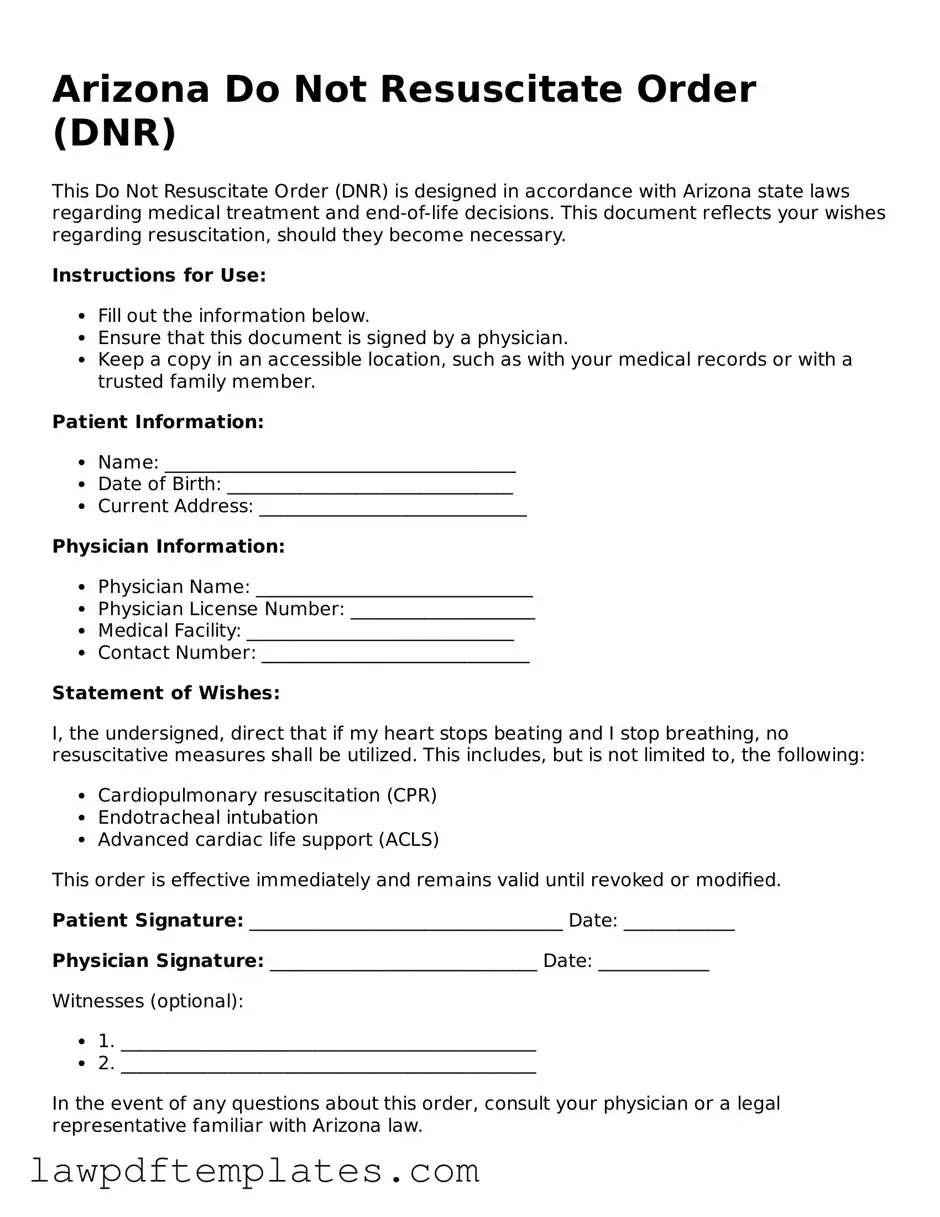Free Do Not Resuscitate Order Template for the State of Arizona
Form Breakdown
| Fact Name | Details |
|---|---|
| Definition | The Arizona Do Not Resuscitate Order (DNR) form is a legal document that allows individuals to refuse resuscitation efforts in the event of a medical emergency. |
| Governing Law | The Arizona DNR form is governed by Arizona Revised Statutes, specifically ARS § 36-3201 to 36-3210. |
| Eligibility | Any adult with decision-making capacity can complete a DNR order. Minors require consent from a parent or legal guardian. |
| Signature Requirements | The form must be signed by the individual or their legal representative, and it should be witnessed by two individuals or notarized. |
| Healthcare Provider Involvement | A physician must sign the DNR order to validate it, ensuring that it aligns with the patient's medical condition and wishes. |
| Revocation | Individuals can revoke their DNR order at any time, verbally or in writing, and should communicate this change to their healthcare providers. |
Sample - Arizona Do Not Resuscitate Order Form
Arizona Do Not Resuscitate Order (DNR)
This Do Not Resuscitate Order (DNR) is designed in accordance with Arizona state laws regarding medical treatment and end-of-life decisions. This document reflects your wishes regarding resuscitation, should they become necessary.
Instructions for Use:
- Fill out the information below.
- Ensure that this document is signed by a physician.
- Keep a copy in an accessible location, such as with your medical records or with a trusted family member.
Patient Information:
- Name: ______________________________________
- Date of Birth: _______________________________
- Current Address: _____________________________
Physician Information:
- Physician Name: ______________________________
- Physician License Number: ____________________
- Medical Facility: _____________________________
- Contact Number: _____________________________
Statement of Wishes:
I, the undersigned, direct that if my heart stops beating and I stop breathing, no resuscitative measures shall be utilized. This includes, but is not limited to, the following:
- Cardiopulmonary resuscitation (CPR)
- Endotracheal intubation
- Advanced cardiac life support (ACLS)
This order is effective immediately and remains valid until revoked or modified.
Patient Signature: __________________________________ Date: ____________
Physician Signature: _____________________________ Date: ____________
Witnesses (optional):
- 1. _____________________________________________
- 2. _____________________________________________
In the event of any questions about this order, consult your physician or a legal representative familiar with Arizona law.
Common mistakes
Completing the Arizona Do Not Resuscitate (DNR) Order form is a significant step for individuals wishing to express their healthcare preferences. However, several common mistakes can lead to confusion or invalidation of the document. Understanding these pitfalls can help ensure that the form accurately reflects one's wishes.
One frequent mistake is failing to provide the necessary signatures. The DNR Order requires the signature of the patient, or the patient's legal representative if the patient is unable to sign. Omitting this critical step can render the document ineffective. It is essential to double-check that all required signatures are present before submitting the form.
Another common error is not clearly indicating the patient's identity. The form must include the full name, date of birth, and other identifying information. Incomplete or incorrect details can lead to misunderstandings about who the DNR Order applies to. Therefore, it is crucial to ensure that all personal information is accurate and legible.
Moreover, individuals often neglect to discuss their wishes with family members or healthcare providers before completing the form. A lack of communication can result in confusion during a medical emergency. By having open conversations about the DNR Order, individuals can ensure that their loved ones and medical staff understand their intentions, thereby preventing potential conflicts or misunderstandings.
Lastly, people sometimes overlook the importance of reviewing the form regularly. As circumstances change, so might one's healthcare preferences. Failing to update the DNR Order can lead to outdated instructions being followed. Regularly revisiting the document ensures that it remains a true reflection of the individual’s current wishes.
Discover More Do Not Resuscitate Order Templates for Specific States
Dnr Do Not Resuscitate - Integration of this order into medical records ensures that wishes are readily available to providers.
Polst Form Illinois - Lawmakers in many states have created standardized forms to simplify the DNR process.
Understanding the process of completing a Power of Attorney document is crucial for anyone looking to delegate authority effectively. For further guidance, consider reviewing the essential information available on the Power of Attorney form in Georgia, which outlines the necessary steps and requirements.
Dnr Cca Meaning - The DNR order specifies that no efforts should be made to restart the heart or breathing.
